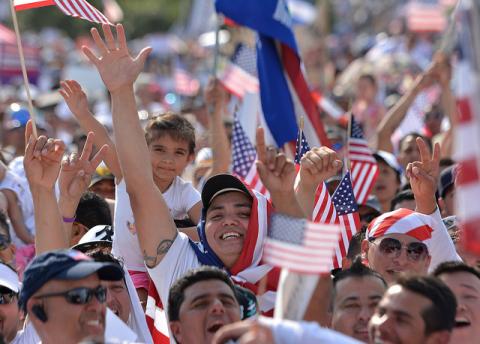
The following reflection was prepared by Judy Coode in 2014, while working with the Maryknoll Office for Global Concerns. Ms. Coode is the coordinator of the Catholic Nonviolence Initiative, a project of Pax Christi International.
In January 2013, the board of commissioners of Carroll County, Maryland voted unanimously to make English the county’s official language. Supporters of the measure clearly state that they want to ensure that undocumented migrants know that they are not welcome in that jurisdiction. Mission accomplished.
Carroll is the third county in Maryland to pass an “English only” ordinance, and is one of dozens - if not hundreds – of local governments in the U.S. to pass such a rule.
What is the source of this, this fear of diversity, this need to establish symbolic walls? How can many people who consider themselves Christian listen to readings such as the ones today from Exodus and Matthew and still justify their xenophobic actions?
Jesus tells us the second great commandment is to love our neighbors as ourselves. How much do we love ourselves? Do we fully recognize our own worth, the fact that we are truly beloved by God, that our existence is woven into the life force of all the rest of creation? God’s enduring love – knitted into all living things – created us, sustains us, heals us, and binds us to one another. When we lose touch with that connection, fear and distrust bleed in.
At a church in my neighborhood, dozens of adults, mostly from Central America, gather on weeknights for English classes. There is great love in the hallways at this little school, held in the same building as Sunday morning Catechism classes. Posters designed for children’s religious education instruction line the walls – Jesus with the lambs, St. Francis with the birds, Mary at Fatima.
The people in these classes are from Mexico, Guatemala, El Salvador, Honduras, and a few are from African countries: Cote D’Ivoire, Mali … One regular student is a woman from Haiti. They are eager and motivated to learn, and they give complete trust to the volunteer teachers who try to help them navigate the choppy waters of English grammar and pronunciation.
Their reason for attending the classes usually is, “I need a better job,” though one man said he hoped to improve his English so that he could understand his children, born in the U.S. and currently in elementary school. The construction workers, hotel maids and kitchen hands listen and read and write, and strive to be good neighbors in their adopted country.
Though we don’t often feel it and sometimes would like to reject the idea, we are connected to all. Our love for ourselves should be healthy and strong, and it should be extended into our love for others. We must be valiant in our efforts to keep fear and distrust at bay. We must trust in God’s overwhelming love for us, and recognize that that same love is extended to all.
Photo from April 2013 rally in Washington, D.C. by David Sachs/SEIU
